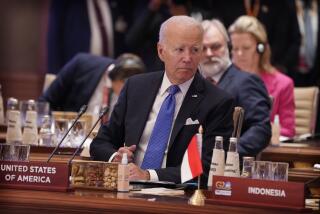India Charges That U.S. Favors Pakistan
- Share via
WASHINGTON — Six months after India and Pakistan stunned the world by conducting underground nuclear tests, the Clinton administration’s intense effort to curb a South Asian nuclear arms and ballistic missile race has hit an unexpected snag.
The Indian government has complained that it gained far less than Pakistan when President Clinton partially lifted punitive economic sanctions last week on the two nations.
The charge has complicated Washington’s already difficult diplomatic campaign to reduce the nuclear threat in one of the world’s most volatile regions.
Deputy Secretary of State Strobe Talbott, who is leading the U.S. effort, repeatedly denied Thursday that Washington is tilting toward Pakistan, a close ally during the Cold War. Saving Pakistan from total economic collapse, he said, “is in India’s interest.”
Talbott was responding to questions after delivering a wide-ranging speech here at the Brookings Institution on the mixed progress he has achieved so far. Talbott has held six rounds of talks with his Indian counterpart, with another meeting scheduled next week, and seven sessions with senior Pakistani officials.
In easing sanctions, which the U.S. imposed after the nuclear tests in May, the White House resumed support for major American business and investment in India and Pakistan through the Export-Import Bank, the U.S. Overseas Private Investment Corp. and the Trade and Development Agency. Restrictions were also waived on lending by private U.S. banks.
The United States also gave the go-ahead for the International Monetary Fund to provide emergency assistance to Pakistan to revive its plummeting economy.
In contrast, India complains that World Bank loans, which it needs, are still blocked.
In addition, Clinton has invited Pakistani Prime Minister Nawaz Sharif to Washington next month.
Talbott declined to say how far either country has gone in deploying nuclear weapons or in securing nuclear command and control systems. Indian newspapers this week quoted Prime Minister Atal Behari Vajpayee as saying talks with Washington had bogged down over U.S. demands that New Delhi disclose its deployment plans.
In his speech, Talbott conceded that U.S. leverage is limited.
“We’re under no illusions that either country will alter or constrain its defense programs under duress or simply because we’ve asked it to,” he said.
In addition, he said, “we have a tricky calculation to make. On one hand, we want to share with them as much as possible what we learned, often the hard way, during the Cold War. But we do not think it is useful or helpful for us to provide what I would call a ‘user’s manual’ because that would imply that we accept they will retain nuclear capabilities forever.”
Talbott cited several “encouraging developments,” however. Both nations have declared voluntary moratoriums on further testing and have indicated that they will adhere to the Comprehensive Test Ban Treaty within a year.
In addition, the two South Asian nations have agreed to join talks in Geneva on a treaty to ban production of fissile material for weapons. However, neither country has agreed to refrain from producing fissile material in the meantime.
Talbott dismissed claims by both countries that their nuclear standoff could increase regional stability. “It’s almost as if they see Cold War brinkmanship between the superpowers as something to be emulated,” he said.
He noted that while the United States and the former Soviet Union never fought a direct conflict, India and Pakistan have fought three wars, and artillery exchanges continue in the disputed territory of Kashmir.
In addition, he urged the two nations to “consider the price tag.” He cited a Brookings study that estimated it cost the U.S. nearly $5.5 trillion to build and maintain its nuclear arsenal. Comparable costs in the Soviet Union helped cause the collapse of its Communist regime.
“When we urge nuclear restraint and warn about the nuclear danger, it’s not from a position of smug superiority,” he said. “Rather it’s from a position of having been there and done that.”
More to Read
Sign up for Essential California
The most important California stories and recommendations in your inbox every morning.
You may occasionally receive promotional content from the Los Angeles Times.














